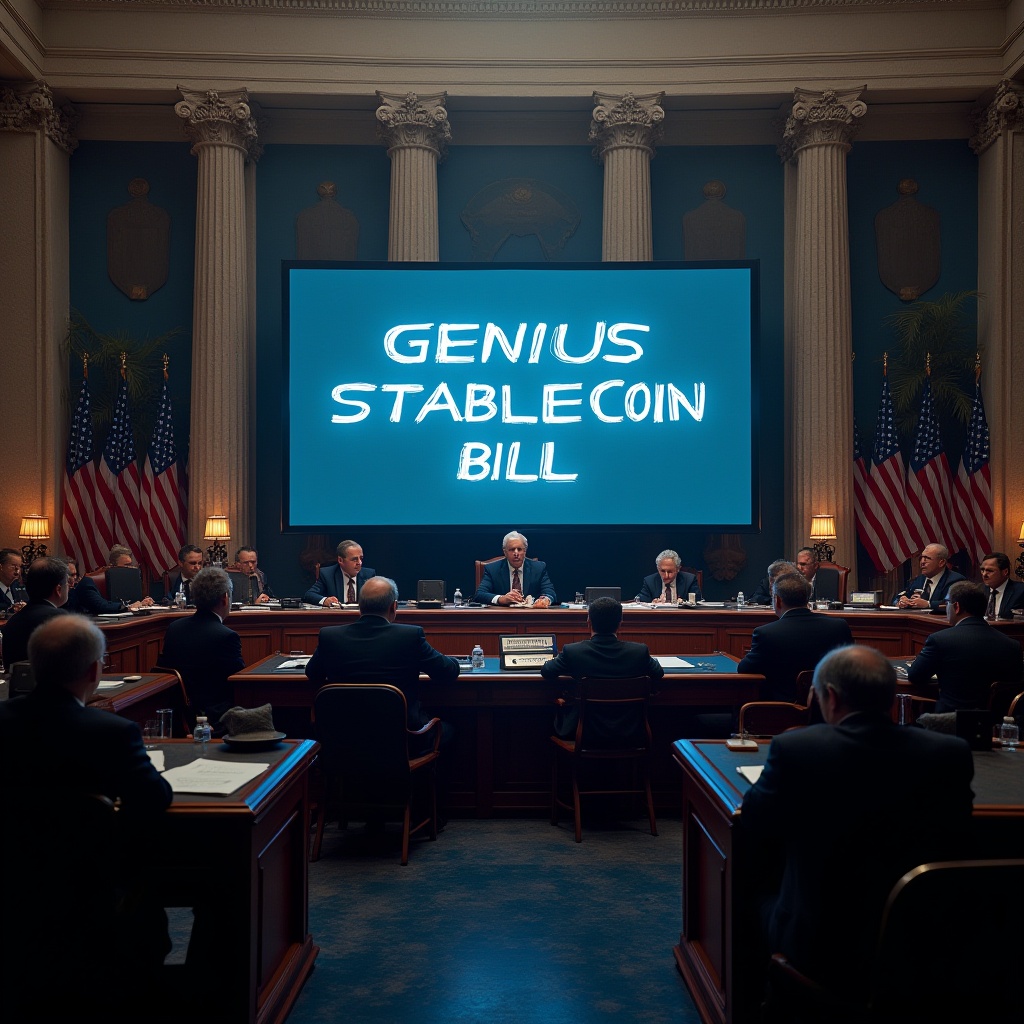What Is the GENIUS Act?
The Guiding and Establishing National Innovation for U.S. Stablecoins (GENIUS) Act is a pivotal piece of legislation introduced in the U.S. Senate in May 2025. Its primary aim is to establish a comprehensive regulatory framework for stablecoins—digital currencies pegged to assets like the U.S. dollar—to ensure their safe and transparent use in the financial system.
The bill was introduced by Senators Bill Hagerty (R-TN), Tim Scott (R-SC), Kirsten Gillibrand (D-NY), Cynthia Lummis (R-WY), and Angela Alsobrooks (D-MD). It has garnered significant bipartisan support, reflecting a shared commitment to providing clarity and security in the rapidly evolving digital asset space.
As of June 11, 2025, the Senate has passed a 68-30 procedural vote to advance the GENIUS Act, bringing it closer to final passage. This marks a significant step toward establishing a clear regulatory framework for stablecoins in the United States.
The GENIUS Act seeks to address several key areas:
- Issuer Requirements: The bill outlines who can issue stablecoins, specifying that only permitted issuers—such as insured depository institutions or qualified nonbank payment stablecoin issuers—may do so.
- Reserve Requirements: It mandates that stablecoins be fully backed by reserves, ensuring that each stablecoin issued can be redeemed at its face value.
- Regulatory Oversight: The bill establishes a dual regulatory system, with federal oversight for large issuers and state oversight for smaller ones, to ensure compliance and stability.
- Consumer Protection: It includes provisions to protect consumers, such as requiring regular audits and disclosures, and setting standards for marketing and redemption practices.
The introduction of the GENIUS Act represents a significant effort by U.S. lawmakers to bring clarity and stability to the stablecoin market, aiming to foster innovation while safeguarding the interests of consumers and the broader financial system.
Key Provisions of the GENIUS Act
The GENIUS Act introduces a comprehensive regulatory framework for stablecoins, aiming to balance innovation with consumer protection. Let’s delve into its key provisions:
Reserve Requirements
The GENIUS Act mandates that stablecoin issuers maintain 100% reserves in U.S. dollars and short-term U.S. Treasury securities or similarly liquid assets. This ensures that every stablecoin issued is fully backed, mitigating the risk of insolvency and protecting consumers from potential losses.
Licensing and Oversight
Issuers with over $10 billion in outstanding stablecoins are subject to federal oversight by the Federal Reserve for depository institutions and the Office of the Comptroller of the Currency (OCC) for nonbank issuers. Those with less than $10 billion may opt for state regulation, provided the state framework is “substantially similar” to federal standards. This dual-regulatory approach aims to prevent a “race to the bottom” among states while allowing flexibility for smaller issuers.
Consumer Protection
The Act prohibits misleading representations about stablecoins, such as claims of U.S. government backing or FDIC insurance. It also mandates monthly public disclosures of reserve compositions and annual audited financial statements for issuers with over $50 billion in market capitalization. These measures aim to enhance transparency and build consumer trust in the stablecoin market.
Anti-Money Laundering (AML) and Sanctions Compliance
The GENIUS Act requires stablecoin issuers to comply with U.S. anti-money laundering laws and sanctions regulations. Issuers must implement AML programs and certify compliance annually. Additionally, the Treasury Department has the authority to designate foreign stablecoin issuers as noncompliant if they fail to comply with U.S. laws, potentially prohibiting their use in the U.S. market.
Reserve Asset Guidelines
The Act specifies acceptable reserve assets, including U.S. dollars, short-term Treasury securities, and certain repurchase agreements. It prohibits the use of riskier assets like corporate debt or equities, aiming to ensure the stability and liquidity of the reserves backing stablecoins.
Insolvency Protections
In the event of an issuer’s insolvency, the GENIUS Act prioritizes stablecoin holders over other creditors, granting them legal claims to the reserve assets. This provision aims to protect consumers and maintain confidence in the stablecoin ecosystem.
These provisions collectively aim to establish a secure and transparent environment for stablecoin operations, balancing the need for innovation with the imperative of consumer protection.
Implications for the General Public and Voters
The GENIUS Act isn’t just a piece of legislation for crypto enthusiasts or financial institutions—it’s a law that directly impacts you, the everyday voter. Whether you’re a parent budgeting for groceries, a student exploring new financial tools, or someone who simply wants to understand how digital money affects your life, this bill matters. Let’s break down what it means for you.
Enhanced Financial Stability
Stablecoins, by design, are digital currencies pegged to stable assets like the U.S. dollar. However, without proper regulation, they’ve existed in a legal gray area, leading to concerns about their reliability. The GENIUS Act addresses this by:
- Mandating 100% Reserve Backing: Issuers must fully back their stablecoins with U.S. dollars or short-term U.S. Treasury securities. This ensures that every digital dollar you hold is genuinely backed by real assets, reducing the risk of devaluation or collapse.
- Prohibiting Riskier Assets: The Act bans the use of volatile assets like corporate debt or equities as reserves, safeguarding your holdings from market fluctuations.
- Ensuring Redemption Guarantees: You can convert your stablecoins back to U.S. dollars on demand, with issuers held accountable for any delays or insolvency.
These measures aim to create a more secure digital currency environment, fostering trust and stability in the financial system.
Consumer Confidence Through Transparency
Trust is the foundation of any financial system. The GENIUS Act promotes transparency by:
- Monthly Public Disclosures: Issuers are required to publish monthly reports detailing their reserve compositions, allowing you to verify that your digital dollars are properly backed.
- Annual Audits for Major Issuers: Stablecoin issuers with over $50 billion in market capitalization must undergo annual audits by registered public accounting firms, ensuring their operations are sound and trustworthy.
- Prohibiting Misleading Marketing: The Act makes it unlawful for issuers to claim that their stablecoins are backed by the U.S. government or are FDIC-insured, protecting you from deceptive practices.
These provisions aim to enhance consumer confidence, making you feel more secure in using stablecoins for everyday transactions.
Lower Transaction Costs and Broader Financial Inclusion
Stablecoins can offer faster and cheaper transactions compared to traditional banking systems. The GENIUS Act facilitates this by:
- Encouraging Digital Payments: By providing a clear regulatory framework, the Act encourages the use of stablecoins for digital payments, potentially reducing transaction fees and processing times.
- Promoting Financial Inclusion: Stablecoins can serve as an entry point into the digital economy for individuals without access to traditional banking services, offering them a means to save, invest, and transact securely.
These changes could lead to more affordable and accessible financial services for you and your community.
Consumer Protection in Case of Insolvency
In the unfortunate event that a stablecoin issuer faces financial difficulties, the GENIUS Act ensures that:
- Priority Claims for Stablecoin Holders: You, as a stablecoin holder, would have priority claims over other creditors in insolvency proceedings, increasing the likelihood of recovering your funds.
- Regulated Custodial Services: Entities providing custodial services for stablecoins must be regulated, ensuring that your digital assets are handled securely and responsibly.
These protections aim to safeguard your interests, providing a safety net in uncertain situations.
Empowering You to Make Informed Decisions
The GENIUS Act not only regulates stablecoins but also empowers you to make informed financial decisions by:
- Providing Clear Information: With mandated disclosures and audits, you can access the information needed to assess the safety and reliability of stablecoin issuers.
- Ensuring Ethical Practices: The Act’s provisions against misleading marketing and conflicts of interest help ensure that issuers operate ethically, protecting you from exploitation.
- Allowing Participation in the Digital Economy: By promoting financial inclusion, the Act opens doors for you to engage in the digital economy, offering new opportunities for saving, investing, and transacting.
In essence, the GENIUS Act aims to create a more transparent, secure, and inclusive financial environment, putting you in control of your digital financial future.
Political Landscape and Bipartisan Support
The GENIUS Act has emerged as a significant piece of legislation in the U.S. Senate, aiming to establish a comprehensive regulatory framework for stablecoins. Its journey through the legislative process has been marked by a blend of bipartisan support, political maneuvering, and scrutiny over potential conflicts of interest.
Bipartisan Sponsorship and Support
The GENIUS Act was introduced by a group of senators from both major political parties, signaling a rare moment of bipartisan cooperation in the realm of cryptocurrency regulation. Key sponsors include Senators Bill Hagerty (R-TN), Tim Scott (R-SC), Kirsten Gillibrand (D-NY), Cynthia Lummis (R-WY), and Angela Alsobrooks (D-MD). Their collective sponsorship underscores a shared recognition of the need for clear guidelines in the rapidly evolving digital asset space.
The bill has garnered support from various quarters, including financial institutions and tech advocates, who view it as a step toward fostering innovation while ensuring consumer protection. Proponents argue that the legislation will provide the regulatory clarity needed to encourage investment and development in the stablecoin sector.
Democratic Concerns and Opposition
Despite the bipartisan sponsorship, the GENIUS Act has faced criticism from some Democratic lawmakers. Senator Elizabeth Warren (D-MA), a vocal critic of the bill, has raised concerns about its potential to benefit private entities, such as former President Trump’s crypto ventures, raising questions about conflicts of interest. She has argued that the bill could facilitate corruption and allow conglomerates to take over the money supply, posing risks to the country’s financial system and democracy.
Additionally, Democrats have expressed apprehension over the bill’s provisions that could enable foreign-issued stablecoins, like Tether, to access U.S. markets without adhering to the same regulatory standards as domestic issuers. This has led to calls for stricter oversight and more robust safeguards to prevent illicit activities and ensure national security.
Political Maneuvering and Conflicts of Interest
The involvement of former President Trump’s family in the cryptocurrency industry has added a layer of complexity to the legislative debate. Trump’s crypto venture, World Liberty Financial, has attracted attention due to its ties to foreign investors and its potential to benefit from the GENIUS Act’s provisions. Senate Democrats have demanded more information about the company’s activities and its connections to the Trump family, citing concerns over potential conflicts of interest.
This situation has intensified the political discourse surrounding the bill, with critics alleging that the legislation could disproportionately favor entities linked to the former president, thereby undermining public trust in the regulatory process.
Path Forward
The GENIUS Act has passed a procedural vote in the Senate, overcoming a filibuster with a 68-30 vote. This advancement paves the way for a final vote in the coming days. If approved by the Senate, the bill will proceed to the House of Representatives for consideration. Should both chambers pass the legislation, it will be sent to President Trump for signing into law.
As the bill moves through the legislative process, it is expected to undergo further scrutiny and potential amendments. The outcome will likely set a precedent for future cryptocurrency regulations and could influence the broader digital asset landscape in the United States.
Next Steps in the Legislative Process
The GENIUS Act is on the verge of becoming the first comprehensive federal legislation to regulate stablecoins in the United States. Here’s what to expect as the bill progresses:
Senate Passage
On June 11, 2025, the U.S. Senate cleared a significant hurdle by passing a procedural vote on the GENIUS Act with a 68-30 result. This vote effectively ends the filibuster, allowing the bill to move forward toward final passage. Senate Majority Leader John Thune has expressed confidence that the full Senate will vote on the bill within the next few days. If approved, the bill will then proceed to the House of Representatives.
House Consideration
The House of Representatives has already taken steps to advance stablecoin regulation. The companion bill, known as the STABLE Act, has cleared both the Financial Services Committee and the Agriculture Committee with bipartisan support. Given the similarities between the GENIUS Act and the STABLE Act, it is expected that the House will consider the Senate’s version of the bill. However, there may be discussions or amendments before it reaches a final vote.
Presidential Approval
If both the Senate and the House pass the GENIUS Act, it will be sent to President Donald Trump for signing into law. The president has previously expressed support for cryptocurrency initiatives, and his backing of the USD1 stablecoin, a project associated with his family, indicates a favorable stance toward stablecoin legislation. Should he sign the bill, the GENIUS Act will become law, establishing a federal regulatory framework for stablecoins.
Implementation Timeline
Upon enactment, the relevant federal agencies, including the Federal Reserve and the Office of the Comptroller of the Currency (OCC), will begin the process of implementing the regulations outlined in the GENIUS Act. This will involve drafting detailed rules, establishing licensing procedures for stablecoin issuers, and setting compliance standards. The implementation phase is expected to take several months, with full regulatory oversight anticipated to be in place by early 2026.
What the GENIUS Act Means for You
The GENIUS Act is more than just a piece of legislation—it’s a pivotal moment in the evolution of digital finance in the United States. As it nears final approval, it’s essential to understand what this means for you, the everyday voter and consumer.
A New Era of Financial Clarity
For years, the world of stablecoins—the digital currencies pegged to assets like the U.S. dollar—has operated in a regulatory gray area. This uncertainty has left consumers vulnerable and innovators hesitant. The GENIUS Act aims to change that by establishing clear rules for stablecoin issuers, ensuring they maintain sufficient reserves and adhere to stringent transparency standards. This move is expected to bolster consumer confidence and encourage responsible innovation in the digital asset space.
Potential Impacts on Your Daily Life
While the direct effects of the GENIUS Act on your daily transactions may be subtle, the broader implications are significant. With clearer regulations, stablecoins could become more widely accepted for everyday purchases, offering faster and cheaper alternatives to traditional payment methods. Additionally, by fostering a more secure digital financial ecosystem, the Act could pave the way for new financial products and services that better meet your needs.
Ongoing Scrutiny and Future Considerations
Despite its advancements, the GENIUS Act is not without its critics. Concerns have been raised about potential conflicts of interest, particularly regarding the involvement of entities linked to former President Donald Trump. Some lawmakers argue that the bill does not go far enough in addressing these issues. As the legislative process continues, it’s crucial to stay informed and engaged, ensuring that the final version of the Act serves the best interests of all Americans.
Your Role in the Process
As a voter and consumer, your voice matters. Stay informed about the progress of the GENIUS Act and its implications. Engage with your elected representatives to express your views and concerns. By actively participating in the democratic process, you can help shape a financial future that is transparent, secure, and inclusive for all.
In conclusion, the GENIUS Act represents a significant step toward modernizing the U.S. financial system. While challenges remain, the Act’s passage could herald a new era of digital financial services that better serve your needs and aspirations.





